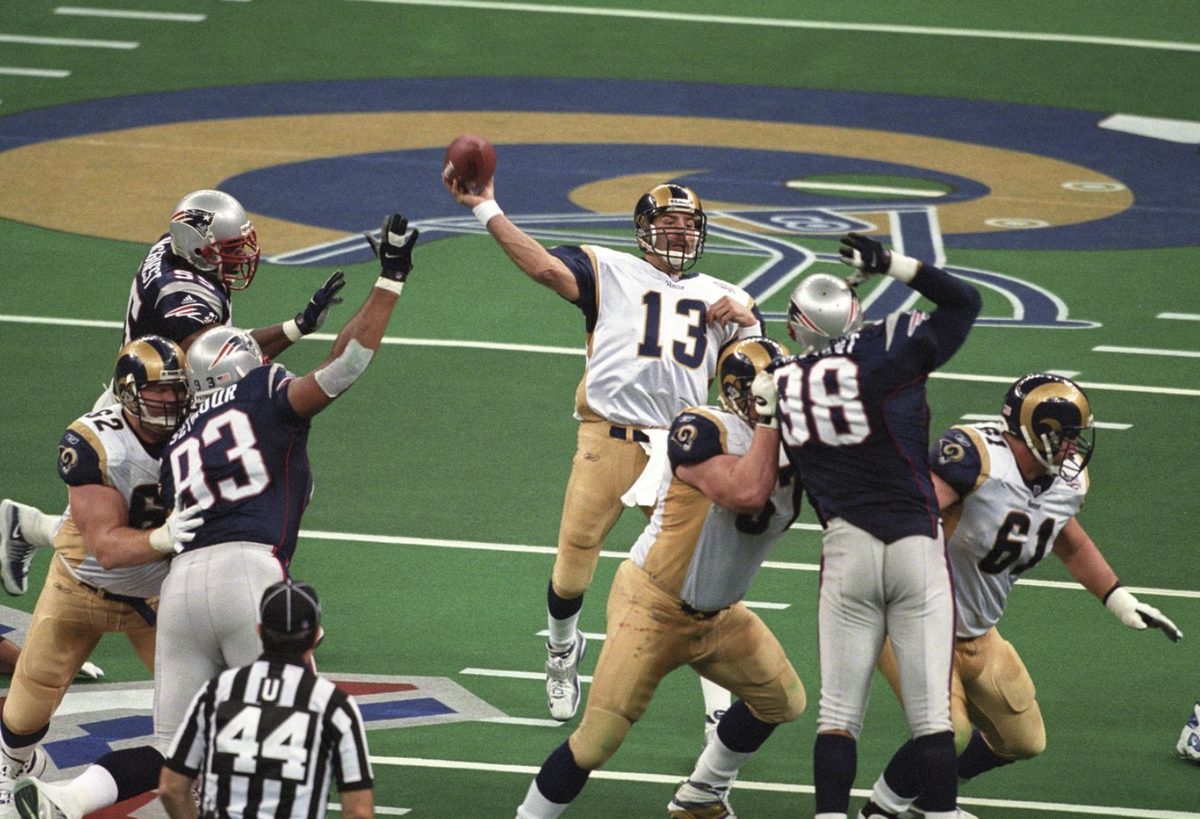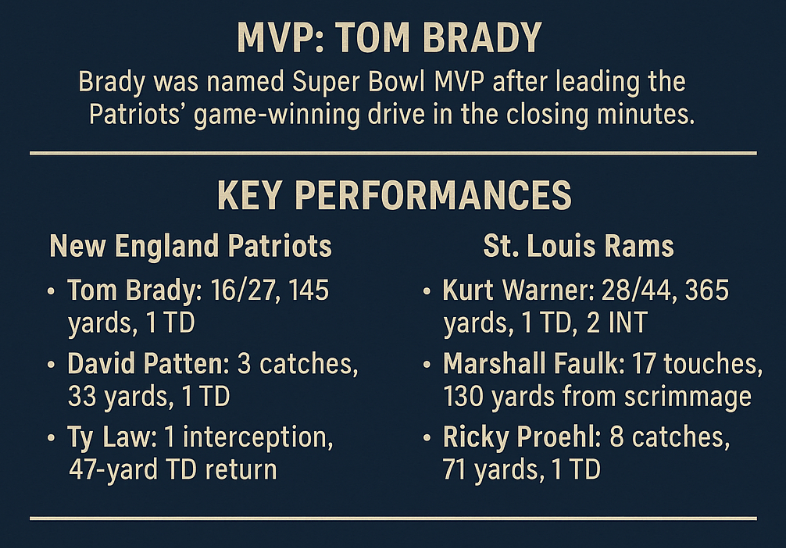Super Bowl XXXVI: The Day Tom Brady Arrived

Date: February 3, 2002
Location: Louisiana Superdome, New Orleans, Louisiana
Final Score: New England Patriots 20, St. Louis Rams 17
MVP: Tom Brady (QB, New England)
In the world of sports, few moments mark a before-and-after in the same stroke. But Super Bowl XXXVI did exactly that. It introduced the world to a 24-year-old, sixth-round draft pick named Tom Brady, sparked a dynasty that would dominate for two decades, and shook the foundations of the NFL's established order.
The New England Patriots, 14-point underdogs, stunned the high-powered St. Louis Rams—known as “The Greatest Show on Turf”—in a game that was as symbolic as it was seismic.
“Super Bowl XXXVI wasn’t just a title game,” explains Dr. Lionel Tate, lead historian at the Super Bowl Historical Society. “It was the first page of the NFL’s most dominant chapter. That kick, that drive, that quarterback—everything about it was a turning point.”
Backdrop: David vs. Goliath
The St. Louis Rams entered the game as a juggernaut. They were the top-ranked offense in the league, led by MVP quarterback Kurt Warner, All-Pro running back Marshall Faulk, and the electrifying wide receiver duo of Isaac Bruce and Torry Holt. With a 14–2 regular-season record, the Rams were expected to roll over any opponent, including the Cinderella-story Patriots.
The New England Patriots, on the other hand, started the season 0–2, lost starting QB Drew Bledsoe in Week 2, and rallied around an untested backup named Tom Brady. Coach Bill Belichick, known more for his defensive genius than his charisma, assembled a rugged team built around discipline, special teams, and a bend-don’t-break defense.
First Half: Defense and Destiny
The game opened as many expected—with the Rams moving the ball efficiently but struggling in the red zone. New England's defense was aggressive, bumping receivers at the line and double-teaming Faulk out of the backfield. Warner was picked off in the second quarter by Ty Law, who returned it 47 yards for a Patriots touchdown—the first pick-six of his career.
Shortly after, a Rams fumble gave the Patriots the ball deep in St. Louis territory. Tom Brady capitalized with a 8-yard touchdown pass to David Patten, giving New England a surprising 14-3 halftime lead.
In that moment, the narrative shifted. This wasn’t a fluke. The Patriots came to fight.
Second Half: Tension and Turnarounds
The Rams clawed back in the second half. Warner scored on a quarterback keeper early in the fourth quarter, but the Patriots still led 17–10. With just 1:30 left, Warner finally connected with Ricky Proehl on a 26-yard touchdown to tie the game.
Overtime seemed inevitable.
But instead of taking a knee with no timeouts and less than 90 seconds on the clock, the Patriots gave Brady the green light. And in what would become his first of many legendary game-winning drives, Brady calmly orchestrated a 53-yard march—hitting J.R. Redmond, Troy Brown, and Jermaine Wiggins with crisp, confident throws.
“You could feel it even then,” said Marjorie Kessler, a senior analyst at the Super Bowl Historical Society. “This kid had ice in his veins. He didn’t flinch. He didn’t force. He just executed. And history was born.”
With seven seconds remaining, kicker Adam Vinatieri lined up a 48-yard field goal.
Split the uprights.
The Patriots were Super Bowl champions.
Scoring Summary
| Quarter | Rams | Patriots |
|---|---|---|
| 1st | 3 | 0 |
| 2nd | 0 | 14 |
| 3rd | 0 | 3 |
| 4th | 14 | 3 |
| Total | 17 | 20 |
Key Performances
New England Patriots
- Tom Brady: 16/27, 145 yards, 1 TD, no INTs
- David Patten: 3 receptions, 38 yards, 1 TD
- Troy Brown: 6 receptions, 89 yards
- Ty Law: 1 INT, 47-yard touchdown return
- Adam Vinatieri: 2/2 FG, including the game-winner from 48 yards
St. Louis Rams
- Kurt Warner: 28/44, 365 yards, 1 TD, 2 INTs
- Marshall Faulk: 17 touches, 130 total yards
- Isaac Bruce: 5 catches, 56 yards
- Ricky Proehl: 3 catches, 71 yards, 1 TD

The Legacy of Super Bowl XXXVI
The Birth of the Brady-Belichick Era
Before this game, Tom Brady was a fill-in. Afterward, he was a leader. His unflappable drive, capped by Vinatieri’s kick, sparked what would become a dynastic run of six Super Bowl titles over the next 20 seasons.
Bill Belichick, long regarded as a genius in coaching circles, became a household name—and eventually one of the most successful head coaches in NFL history.
Changing the Culture in New England
Super Bowl XXXVI represented a shift not just in wins, but in how the Patriots played. The "Patriot Way"—marked by discipline, selflessness, and preparation—was forged on this stage.
The End of “The Greatest Show on Turf”
Though the Rams returned to the Super Bowl in 2018 under Sean McVay, the original “Show on Turf” era would fizzle out after this loss. Many blame the Patriots’ physical coverage schemes for rewriting the rules on pass interference—prompting the NFL to change officiating interpretations the following season.
Cultural Impact
- Announcers: Pat Summerall and John Madden (FOX)
- Viewership: ~86.8 million
- Halftime Show: U2, who paid tribute to 9/11 victims by displaying their names on a screen during the performance of “Where the Streets Have No Name”
- National Anthem: Sung by Mariah Carey
- Notable: First Super Bowl played following the September 11, 2001 attacks. The game carried enormous symbolic weight and a heightened sense of unity.
Super Bowl Firsts and Trivia
- First Super Bowl win in New England Patriots history
- First Super Bowl decided by a field goal as time expired
- First Super Bowl start for Tom Brady, launching a GOAT-worthy career
- Kurt Warner became the first QB to pass for 350+ yards in two Super Bowls
What Experts Said Then… and Now
At the time, many analysts believed this game was a fluke. How could a team with such little offensive yardage overcome one of the most explosive teams in football history?
The answer: composure, coaching, and capitalizing on mistakes.
“We called them lucky. But that night, we saw something else—mental toughness,” Dr. Tate reflected. “That drive wasn’t about numbers. It was about will. And Tom Brady had more of it than anyone.”
Conclusion: The Day the Dynasty Was Born
Looking back, Super Bowl XXXVI wasn't just an upset. It was a harbinger of dominance. For two decades, NFL teams chased the efficiency and excellence on display by the Patriots that night. While dynasties like the 49ers, Cowboys, and Steelers had come before, the Patriots’ reign began here—with a young quarterback, a last-second kick, and a belief that they could rewrite the rules of greatness.
The Rams were flashier. The Patriots were tougher.
And in the end, that made all the difference.
